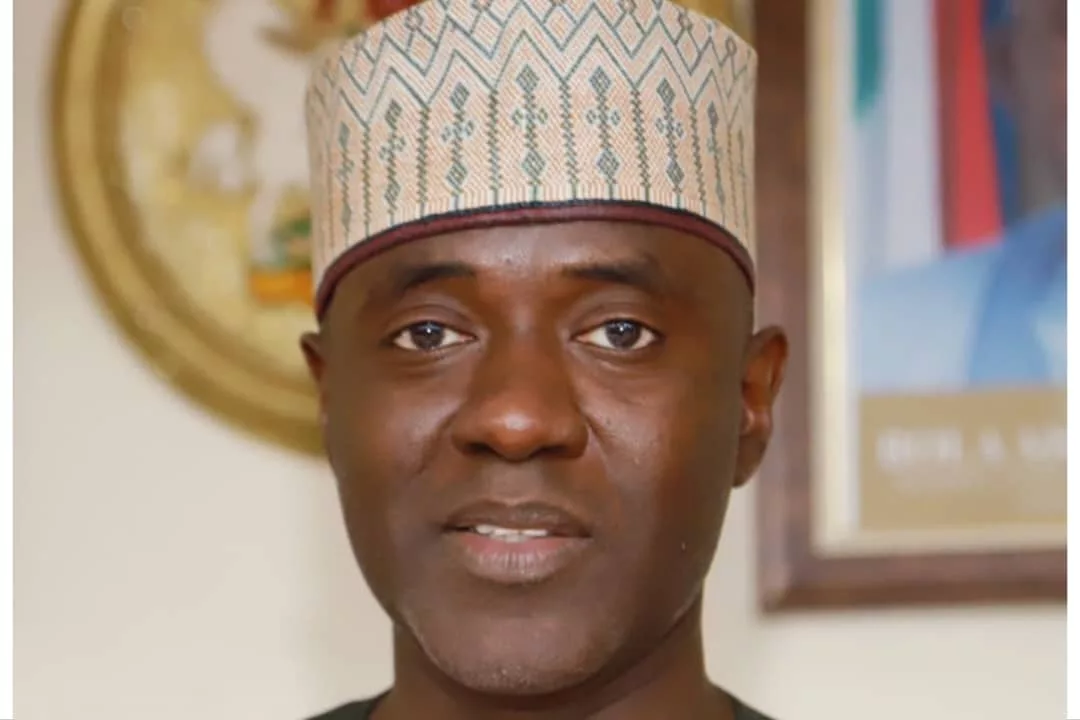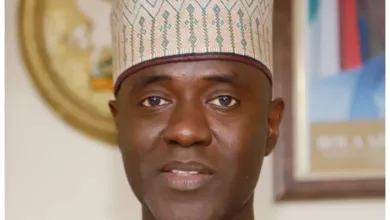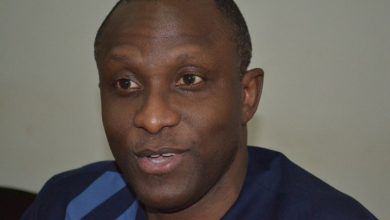OpinionTechnology
X-Raying Maida’s Agenda for Nigeria’s $76b Telecoms Sector

By Adeyemi Adepetun
The Executive Vice Chairman of the Nigerian Communications Commission (NCC), Dr. Aminu Maida, in Lagos last week, met with journalists to explain his vision for the telecoms sector in the next five years and called on stakeholders for support. But it is too early in the day to tell how far the chief executive will go in achieving his goals, ADEYEMI ADEPETUN writes.
Accompanied to Lagos by the NCC team, including the executive commissioners in charge of stakeholder management and technical services (Adeleke Adewolu and Ubale Maska, the Executive Vice Chairman of the Nigerian Communications Commission NCC), Dr Aminu Maida, at a media parly in Lagos, listed four critical areas of concentration to reposition Nigeria’s $76 billion telecoms sector.
According to Maida, the four-point agenda includes improved regulatory services, a stronger sense of cooperation among operators/with the regulator, leveraging technology to improve the quality of service and building more accountable operators. The areas are summed up in collaboration, data-centric, compliance and digitalisation of the sector. To achieve the four goals, the NCC under Maida will work with three major stakeholders – consumers, operators (investors) and the government.
To be guided by the provisions of the Nigerian Communications Act (NCA 2003), Maida said though the commission will allow for supervision, he will never give room for regulatory capture of NCC, rather, would work in line with the provisions of the 2003 Act, which laid down guidelines on how to evolve a desirable regulatory environment.
He, however, assured that he would continue some of the programmes of the previous administration of NCC, which truly laid the background for effective regulatory achievements.
Maida assured that the NCC will be “reviewing the operating standards and introducing new ones, which are in line with international best practices. We are going to be leveraging technology to review our regulatory services and internal processes so that our turnaround time for our regulatory services is greatly improved.”
From QoS to QoE
The NCC EVC is keen on focusing on the needs of each stakeholder in the telecoms value chain. “For instance, we know consumers are looking for total quality of experience (QoE). We will be driving QoE, right from the point of how they find and select telecoms services.
“We will be leveraging data to empower consumers to make the right choice so that we can move away from the world where we have multiple SIM devices.
“Rather than multiple devices and SIM cards, we are looking at a situation, where consumers will only have one SIM card and one device.
“We are also going to be working with our licensees on data tariff, speed and coverage. We are going to be working with our licensees to see how tariffs can be simpler and more transparent,” he stated.
According to him, NCC will enlighten consumers to understand the habits that drive greater data usage, “because as we upgrade our phones, we are buying phones with stronger data tolerance, which are producing better quality pictures and posting them on our social media platforms, but fail to realize that these habits consume data faster.
“We are also going to be focusing on issues that have escalated. We are going to be stepping in, as a regulator, to see what the common issues that consumers are complaining about, what are the regulators doing about them, so that we can hold everybody in the value chain accountable.
Mobile fraud prevention
Still, on consumer protection, Maida, who just clocked 100 days in office, informed that the Commission would soon develop a regulation that will make it a criminal offence for anyone to use their mobile lines for fraud.
According to him, as of now, there is no consequence for using mobile lines for fraud, which is why many people have continued to perpetrate the nefarious act unchecked.
Maida said the regulation that will come up later this year would ensure that fraudsters using mobile lines for fraud face consequences.
The EVC also expressed concerns over people using other people’s lines to commit fraud because of recycling.
To address this, he said Nigerian banks would also need to continuously revalidate the ownership of numbers attached to bank accounts as telecoms operators are bound to recycle and resell mobile lines not used for a certain period.
Highlighting the Commission’s strategic focus for the year, Maida said: “We want to protect the integrity of our mobile numbers. When we don’t use it for a while, it has to be recycled and this exposes people to fraud. We want to create more awareness about this so that people can understand that there is a window during which if they do not use their line, it can be allocated to another person.
“People are using mobile numbers for a lot of frauds today and this is because there is no consequence. We are coming up with a regulation that will make sure there is a consequence for using your mobile for fraud.”
Operators to be accountable
Maida added that the Commission would strongly exercise its regulatory authority and ensure that licensees comply with their obligations and meet agreements. He said licensees must be ready to comply with the standards of the commission as well as ensure they keep to their part of any agreements made in any deal.
“Compliance is also another driver. As a regulator, as empowered by the NCA Acts and regulations we put in place. We have the power to hold our licensees to their obligations.
“So over the past couple of years, I think the industry has been in what I would say development phase, but it’s time we push ourselves into a maturity phase whereby we will be driving compliance. “Compliance would be something you’re going to be seeing that we drive very strongly.
“Whenever our licensees have an obligation to meet, we will be expecting them to meet those obligations. If they have agreements between themselves, we’ll be expecting them to meet those agreements,” he said.
All SIMs must be registered, linked
Parts of the digitisation the sector expected to see will be to see that all Subscribers Identification Modules (SIM) cards are registered and linked to their National Identification Number (NIN).
Maida, who emphasised the importance of SIM registration, said directives are already out for all SIMs to be linked, stressing that operators will bar any unlinked telephone lines by February 29.
Speaking more on the enforcement, the Director of Compliance Monitoring and Enforcement, NCC, Efosa Idehen, said the Commission is doing everything possible to ensure that SIM-related crimes are reduced.
While statistics showed that as of August 2023, over 300 million SIMs have been connected in Nigeria, of which 220 million are active since the telecoms revolution started over two decades now, Idehen emphasised that buying pre-registered SIM remains a criminal offence, stressing that the Commission will arrest and prosecute any individual or group involved in the sales and use of pre-registered SIM cards in Nigeria.
“For every device registered with a SIM card, we know the person behind it. Therefore, every SIM card not linked to NIN will be removed,” he stated.
Maida informed that harmonisation of the disparate data in the country is currently ongoing, stressing that it is a major task before the Ministry of Communications, Innovation and Digital Economy.
InfraCos, RoW and Multiple Taxation
Maida agreed that not much success was recorded on the InfraCo project, which was initiated to drive and deepen broadband penetration in the country, due to several challenges, including Right of Way (RoW), return on investments, multiple taxation, among others.
On the issue of taxation, the EVC said there is a presidential committee looking into harmonising the taxes. On RoW, while commending states that have cancelled RoW charges and those, which reduced the fees significantly, Maida said states are implementing some policies based on how it suits them.
He disclosed that the Federal Government already set up the National Broadband Alliance for Nigeria (NBAN) to foster collaboration for broadband development and adoption, as well as position Nigeria at the forefront of the global digital landscape.
Resolving N200b USSD debts, planned tariff increase
HOPEFULLY, in the coming days or weeks, Maida will be able to brief the industry about his efforts on the protracted N200 billion unstructured supplementary service data (USSD) debts, which has pitched the banks against the telcos in the last four years. How he resolves this will demonstrate his commitment to building a more sustainable industry.
The NCC EVC has equally not stated his views on calls by telcos on the need to increase tariffs on telephony services in the country.
The Chairman of the Association of Licensed Telecoms Operators of Nigeria (ALTON) Gbenga Adebayo on behalf of the players, stressed the need for operators to increase tariffs to reflect the current economic status of the country.
Adebayo noted that every other thing in Nigeria in terms of prices has gone up, except telephony services.
It is believed that Maida’s collaborative approach would help find a lasting solution to the crisis in the shortest possible time.
First published in Guardian Nigeria





